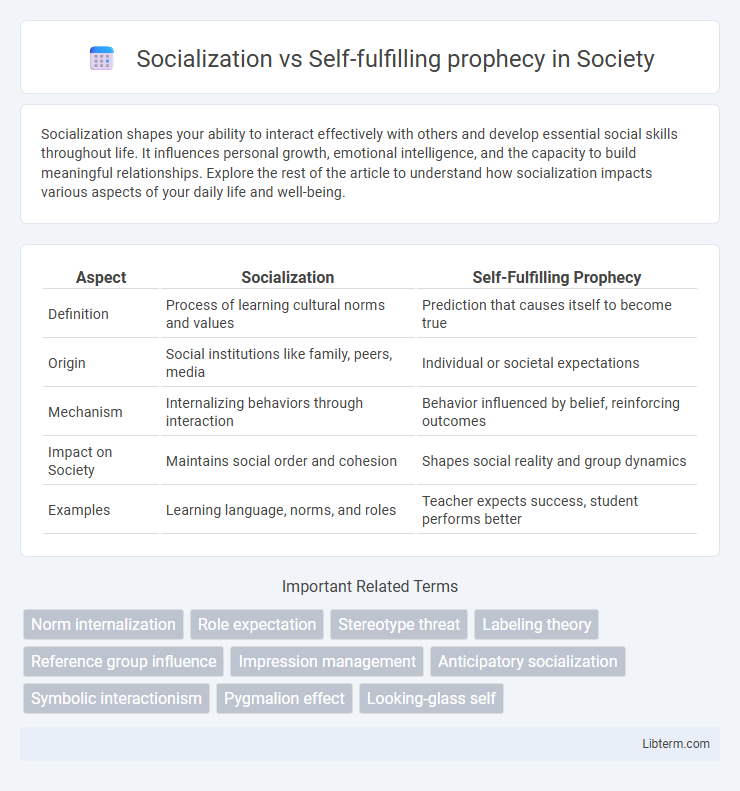Socialization shapes your ability to interact effectively with others and develop essential social skills throughout life. It influences personal growth, emotional intelligence, and the capacity to build meaningful relationships. Explore the rest of the article to understand how socialization impacts various aspects of your daily life and well-being.
Table of Comparison
| Aspect | Socialization | Self-Fulfilling Prophecy |
|---|---|---|
| Definition | Process of learning cultural norms and values | Prediction that causes itself to become true |
| Origin | Social institutions like family, peers, media | Individual or societal expectations |
| Mechanism | Internalizing behaviors through interaction | Behavior influenced by belief, reinforcing outcomes |
| Impact on Society | Maintains social order and cohesion | Shapes social reality and group dynamics |
| Examples | Learning language, norms, and roles | Teacher expects success, student performs better |
Understanding Socialization: The Foundation of Human Behavior
Socialization is the process through which individuals acquire values, norms, and behaviors essential for functioning within society, shaping their identity and social skills from early childhood. This foundational experience influences how people interpret and respond to social cues, which can lead to self-fulfilling prophecies when expectations about behavior reinforce the actual outcomes. Understanding socialization reveals how deeply embedded societal roles and perceptions affect individual actions and long-term personal development.
Defining the Self-Fulfilling Prophecy in Social Contexts
The self-fulfilling prophecy in social contexts occurs when an individual's behavior aligns with others' expectations or stereotypes, thereby confirming those beliefs. This phenomenon highlights the powerful role of socialization processes, where societal norms and labels shape personal identity and actions. Understanding this dynamic is crucial for addressing how expectations influence individual development and social interactions.
The Interplay Between Socialization and Expectations
Socialization shapes individual behavior by imparting societal norms and values, which influence how people internalize expectations placed upon them. Self-fulfilling prophecy emerges when these expectations, communicated through social interactions, lead individuals to act in ways that confirm the initial beliefs. The dynamic interplay between socialization processes and expectation-driven behavior reinforces identity formation and social roles within communities.
Agents of Socialization: Shaping Beliefs and Behaviors
Agents of socialization such as family, peers, schools, and media play a crucial role in shaping individuals' beliefs and behaviors by transmitting cultural norms and values. These agents influence how people internalize societal expectations, which can contribute to the development of self-fulfilling prophecies where individuals conform to the labels and stereotypes assigned to them. Understanding the interaction between socialization processes and self-fulfilling prophecies highlights the powerful impact of social environments on identity formation and behavior patterns.
How Self-Fulfilling Prophecies Influence Individual Outcomes
Self-fulfilling prophecies significantly shape individual outcomes by creating expectations that influence behavior and performance in social settings. When individuals internalize external beliefs or stereotypes, their actions tend to conform to those anticipations, reinforcing the initial prediction. This phenomenon impacts academic achievement, workplace dynamics, and interpersonal relationships by perpetuating cycles of success or failure aligned with societal labels.
Social Norms and Their Role in Self-Perception
Social norms shape individual behavior by providing unwritten rules that guide socialization and influence self-perception. When individuals internalize social expectations, they often align their actions and beliefs to fit these norms, reinforcing the self-fulfilling prophecy where behavior conforms to anticipated outcomes. This dynamic highlights the powerful role of socialization in creating and sustaining beliefs about oneself through continuous feedback from social environments.
The Cycle of Reinforcement: From Stereotypes to Reality
Socialization plays a critical role in shaping individual behavior through repeated exposure to societal stereotypes, which can trigger a self-fulfilling prophecy by reinforcing expected outcomes. The cycle of reinforcement occurs as societal expectations influence individuals to conform to stereotypes, thereby turning preconceived notions into tangible realities. Research in social psychology highlights that this dynamic perpetuates social inequalities by embedding biased beliefs into everyday interactions and personal identity formation.
Breaking Negative Patterns: Overcoming Limiting Prophecies
Breaking negative patterns involves challenging the self-fulfilling prophecy by consciously reshaping socialization processes that reinforce limiting beliefs. Individuals can overcome constraining prophecies by adopting new behaviors and attitudes, thereby altering others' expectations and breaking the cycle of negativity. Cognitive restructuring and positive reinforcement play crucial roles in transforming internalized social narratives and fostering personal growth.
The Impact of Socialization on Group Dynamics
Socialization profoundly shapes group dynamics by establishing shared norms, values, and behaviors that influence individual roles and interactions within the group. This process fosters cohesion and cooperation, enabling members to align their actions with collective expectations, which reinforces group identity and stability. Socialization also moderates the effects of self-fulfilling prophecies by guiding individuals to conform to anticipated roles, thereby perpetuating existing social structures and influencing behavioral outcomes in group settings.
Fostering Positive Self-Fulfilling Prophecies in Society
Fostering positive self-fulfilling prophecies in society involves leveraging socialization processes to shape individuals' beliefs and behaviors toward constructive outcomes. By promoting inclusive educational environments and reinforcing affirmative social roles, communities can encourage individuals to internalize positive expectations and realize their potential. Social institutions play a crucial role in creating feedback loops where positive perceptions lead to enhanced performance, thereby strengthening societal well-being and cohesion.
Socialization Infographic

 libterm.com
libterm.com